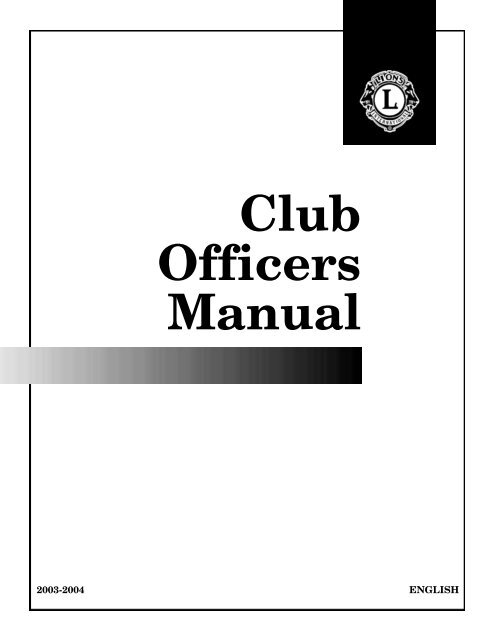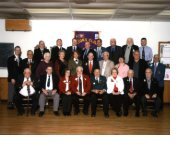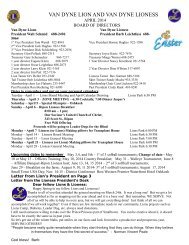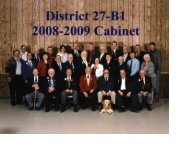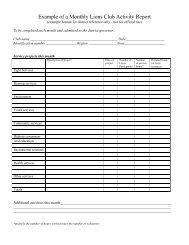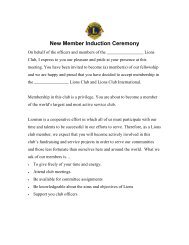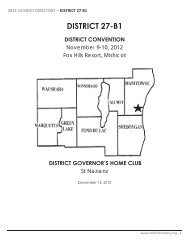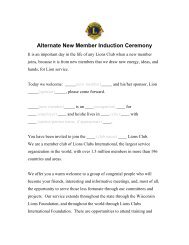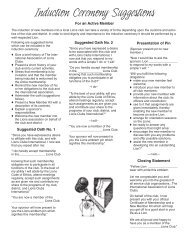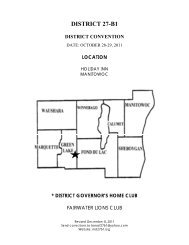Club Officers Manual - Fond du Lac Evening Lions, Wisconsin
Club Officers Manual - Fond du Lac Evening Lions, Wisconsin
Club Officers Manual - Fond du Lac Evening Lions, Wisconsin
Create successful ePaper yourself
Turn your PDF publications into a flip-book with our unique Google optimized e-Paper software.
<strong>Club</strong><br />
<strong>Officers</strong><br />
<strong>Manual</strong><br />
2003-2004 ENGLISH
LIONS<br />
Code of Ethics<br />
TO SHOW my faith in the worthiness of my<br />
vocation by in<strong>du</strong>strious application to the end that<br />
I may merit a reputation for quality of service.<br />
TO SEEK success and to demand all fair<br />
remuneration or profit as my just <strong>du</strong>e, but to<br />
accept no profit or success at the price of my own<br />
self-respect lost because of unfair advantage taken<br />
or because of questionable acts on my part.<br />
TO REMEMBER that in building up my business<br />
it is not necessary to tear down another’s; to be<br />
loyal to my clients or customers and true to myself.<br />
WHENEVER a doubt arises as to the right or<br />
ethics of my position or action towards others, to resolve<br />
such doubt against myself.<br />
TO HOLD friendship as an end and not a means.<br />
To hold that true friendship exists not on account of the<br />
service performed by one to another, but that<br />
true friendship demands nothing but accepts<br />
service in the spirit in which it is given.<br />
ALWAYS to bear in mind my obligations as a<br />
citizen to my nation, my state and my community, and to<br />
give them my unswerving loyalty in word,<br />
act and deed. To give them freely of my time,<br />
labor, and means.<br />
TO AID others by giving my sympathy to those in distress,<br />
my aid to the weak, and my substance to the needy.<br />
TO BE CAREFUL with my criticism and liberal with my<br />
praise; to build up and not destroy.<br />
Mission<br />
Statement<br />
TO CREATE AND FOSTER a spirit of under -<br />
standing among all people for humanitarian needs<br />
by providing voluntary services through communi -<br />
ty involvement and international cooperation<br />
<strong>Lions</strong> <strong>Club</strong>s<br />
International<br />
OBJECTS<br />
TO CREATE and foster a spirit of understanding<br />
among the peoples of the world.<br />
TO PROMOTE the principles of good government<br />
and good citizenship.<br />
TO TAKE an active interest in the civic, cultural,<br />
social and moral welfare of the community.<br />
TO UNITE the clubs in the bonds of friendship,<br />
good fellowship and mutual understanding.<br />
TO PROVIDE a forum for the open discussion of<br />
all matters of public interest; provided, however,<br />
that partisan politics and sectarian religion shall<br />
not be debated by club members.<br />
TO ENCOURAGE service-minded people to<br />
serve their community without personal financial<br />
reward, and to encourage efficiency and promote<br />
high ethical standards in commerce, in<strong>du</strong>stry,<br />
professions, public works and private endeavors.
<strong>Club</strong> <strong>Officers</strong> <strong>Manual</strong><br />
Table of Contents<br />
I. ESSENTIAL INFORMATION ..................................................................................4<br />
A. Resources ..............................................................................................................4<br />
1. International Headquarters...........................................................................4<br />
2. <strong>Lions</strong> <strong>Club</strong>s International Web Site..............................................................4<br />
3. Standard Form <strong>Lions</strong> <strong>Club</strong> Constitution and By-Laws ...............................4<br />
4. Periodicals.......................................................................................................4<br />
5. International Program ...................................................................................5<br />
6. District <strong>Officers</strong> ..............................................................................................5<br />
7. <strong>Lions</strong> <strong>Club</strong>s International Foundation..........................................................5<br />
B. <strong>Club</strong> Structure......................................................................................................6<br />
1. <strong>Officers</strong> .............................................................................................................6<br />
2. Committees ...................................................................................................6<br />
3. Membership Categories ................................................................................6<br />
4. <strong>Club</strong> Financing ...............................................................................................6<br />
C. Use of <strong>Lions</strong> Name and Emblem.........................................................................7<br />
D. Limits on Authority..............................................................................................8<br />
E. Leadership Skills..................................................................................................8<br />
F. Status Quo and <strong>Club</strong> Cancellation ......................................................................8<br />
G. <strong>Club</strong> Mergers, Name Changes and Single <strong>Club</strong> Transfers ...............................9<br />
H. <strong>Club</strong> Officer Training at the District Level........................................................9<br />
II. CLUB MANAGEMENT.........................................................................................10<br />
A. Beginning the Year.............................................................................................10<br />
1. Preparation ...................................................................................................10<br />
2. Setting Goals.................................................................................................10<br />
3. Making Committee Assignments.................................................................10<br />
4. Selecting Service Activities ..........................................................................11<br />
5. Determine Record Keeping Methods...........................................................11<br />
6. Know Your Forms .........................................................................................11<br />
7. Fiscal Responsibilities..................................................................................12<br />
B. Throughout the Year ..........................................................................................12<br />
1. Running Meetings ........................................................................................12<br />
2. Communicating Effectively..........................................................................13<br />
3. Handling Correspondence............................................................................13<br />
4. Understanding Membership Issues.............................................................13<br />
5. Attendance ....................................................................................................14<br />
6. Financial Responsibilities............................................................................14<br />
7. Promoting Your <strong>Club</strong>....................................................................................16<br />
8. New <strong>Club</strong> Extension.....................................................................................16<br />
9. Attending Zone Meetings .............................................................................16<br />
10. District Governor ’s <strong>Club</strong> Visit......................................................................16<br />
11. Attending Conventions.................................................................................17<br />
C. Finishing the Year..............................................................................................17<br />
1. Recognition....................................................................................................17<br />
2. Transitioning to the Next Leadership Team...............................................17<br />
2
CLUB OFFICERS MANUAL<br />
This manual contains helpful information to guide you through your year as a club<br />
officer. The association recognizes that each <strong>Lions</strong> club is unique, and people have<br />
different management styles. To accommodate these facts, there is a great deal of<br />
latitude in how you choose to manage your club—as long as you follow the basic<br />
club requirements set forth in the Standard Form <strong>Lions</strong> <strong>Club</strong> Constitution and By-<br />
Laws.<br />
Serving as a club officer is a privilege and honor bestowed upon you by club<br />
members. Through your election, your peers have recognized your leadership skills<br />
and potential to manage the club effectively. Your term in office will offer many<br />
opportunities to learn new skills, improve others and grow as a leader through<br />
experience. By taking advantage of the many opportunities to learn and grow, your<br />
term can have personal and professional development benefits that will last a<br />
lifetime.<br />
All the members of your club are part of your team, and it is the club officers’<br />
responsibility to guide members toward reaching the club’s goals. Every member<br />
has his or her important role to fill, and by working together, your club will be able<br />
to meet its full potential and serve a vital role in your community.<br />
3
A. Resources<br />
I. ESSENTIAL INFORMATION<br />
There is an abundance of information, materials and people ready to assist you as<br />
you serve your term in office. You may take advantage of these resources as needed.<br />
1. International Headquarters: International Headquarters has many<br />
resources accessible to you. The staff is ready to assist you in any way possible.<br />
Familiarizing yourself with International Headquarters structure can help you use<br />
this important resource more effectively. Visit the <strong>Lions</strong> <strong>Club</strong>s International Web<br />
site, www.lionsclubs.org, or refer to issues of THE LION Magazine to find a<br />
listing of specific contact numbers for International Headquarters departments.<br />
2. <strong>Lions</strong> <strong>Club</strong>s International Web Site: The <strong>Lions</strong> <strong>Club</strong>s International<br />
Official Web site, located at www.lionsclubs.org, is an essential tool for club<br />
officers. There are hundreds of pages of information on the site, organized in an<br />
easy-to-follow format. New items are added weekly, and innovations are continually<br />
pursued.<br />
There is basic information about the association’s programs, contact information<br />
and e-mail links to International Headquarters, various directories and an online<br />
<strong>Club</strong> Supplies section. There is also a Publication and Logo Library for<br />
downloading materials, which saves both time and money. You may also file various<br />
forms, including the Monthly Membership Report, <strong>Club</strong> Officer Report, and Annual<br />
Activities Report, via the Web site. For more information regarding online report<br />
filing, visit the Web site, or contact the Information Technology Division at<br />
International Headquarters. The division’s e-mail address is it@lionsclubs.org.<br />
3. Standard Form <strong>Lions</strong> <strong>Club</strong> Constitution and By-Laws: The Standard<br />
Form <strong>Lions</strong> <strong>Club</strong> Constitution and By-Laws (LA-2), available on the Web site, is<br />
another important item for club officers. The Constitution and By-Laws outlines<br />
the structure, <strong>du</strong>ties and responsibilities of <strong>Lions</strong> clubs and is the ultimate guide<br />
for club management. Information contained within this constitution is the club’s<br />
primary governing guidelines.<br />
4. Periodicals: Each <strong>Lions</strong> club member receives THE LION Magazine. <strong>Club</strong><br />
presidents receive Update, which contains important information about association<br />
policies and programs. There is also a monthly newsletter located on the Web site.<br />
4
5. International Program: This program, which explains the international<br />
president’s focus for the year, is available on the association’s Web site and in THE<br />
LION Magazine. It is suggested that clubs choose some activities that correspond to<br />
the programs featured in this publication.<br />
6. District <strong>Officers</strong>: Locally you can rely on your district governor, region<br />
chairman and zone chairman to help you with questions and problems that may<br />
arise <strong>du</strong>ring your year. Many districts also have materials for clubs, such as a video<br />
lending library, that may be helpful. Often, past officers can offer advice based on<br />
their experiences.<br />
7. <strong>Lions</strong> <strong>Club</strong>s International Foundation: Located at International<br />
Headquarters, <strong>Lions</strong> <strong>Club</strong>s International Foundation (LCIF) is the charitable<br />
funding arm of the association. It disburses grants in several categories for largescale<br />
efforts, such as SightFirst, International Assistance, Core-4 and Disaster<br />
Relief. Please contact LCIF or visit the foundation’s Web site at www.lcif.org to<br />
learn more about the foundation’s programs and how your club can become<br />
involved.<br />
Essential Resources for <strong>Club</strong> <strong>Officers</strong><br />
• International Headquarters<br />
300 W. 22nd Street<br />
Oak Brook, IL 60523-8842<br />
Phone: (630) 571-5466<br />
Fax: (630) 571-8890<br />
E-mail: English_Language@lionsclubs.org<br />
• <strong>Lions</strong> <strong>Club</strong>s International Web Site: www.lionsclubs.org<br />
• Standard Form <strong>Lions</strong> <strong>Club</strong> Constitution and By-laws (LA-2)<br />
5
B. <strong>Club</strong> Structure<br />
<strong>Club</strong>s are composed of several leadership positions. Working together,<br />
these club leaders manage club operations. Please refer to the Standard<br />
Form <strong>Lions</strong> <strong>Club</strong> Constitution and By-Laws for a specific listing of position<br />
responsibilities.<br />
1. <strong>Officers</strong>:<br />
• President<br />
• Immediate Past President<br />
• Vice Presidents<br />
• Secretary<br />
• Treasurer<br />
• Lion Tamer<br />
• Tail Twister (optional)<br />
• Membership Director<br />
• Board of Directors<br />
2. Committees: Committees contribute to the success of a club by concentrating<br />
on a specific area and making sure that the club’s goals in that area are met.<br />
Typically, committees are formed to focus on areas such as club meeting programs,<br />
community service, fundraising projects, club finances, membership development,<br />
public relations and constitution and by-laws. <strong>Club</strong>s are encouraged to appoint an<br />
information technology chairman to accelerate the club’s use of technology. <strong>Club</strong>s<br />
may form additional committees as deemed necessary.<br />
3. Membership Categories: There are seven types of membership:<br />
• Active<br />
• Affiliate<br />
• Associate<br />
• Honorary<br />
• Life<br />
• Member-at-Large<br />
• Privileged<br />
Please refer to the Standard Form <strong>Lions</strong> <strong>Club</strong> Constitution and By-Laws for a<br />
description of each membership category.<br />
4. <strong>Club</strong> Financing: Most clubs use the budget system of financing. This is a<br />
practice of anticipating in advance as accurately as possible the income and<br />
expenses of your club for a specific period and then preparing a budget on that<br />
basis. Budgets should not be considered as mandates or approvals for spending, but<br />
rather as guidelines for spending.<br />
6
<strong>Club</strong>s should have two budgets for their fiscal year: (1) an administrative budget<br />
and (2) an activities budget. The administrative budget is what finances club<br />
operations. Its income comes mostly from club <strong>du</strong>es. The activities budget finances<br />
the club’s activities and projects. Its income should come from special fundraising<br />
projects held by the club in the community. Under no circumstances can any of the<br />
income from the club’s fundraising projects be used to defray the club’s<br />
administrative costs, even if you advertise that funds raised will be used for the<br />
club’s own purposes. You can, however, de<strong>du</strong>ct the direct operating expenses of the<br />
fundraising project from the funds raised.<br />
C. Use of <strong>Lions</strong> Name and Emblem<br />
The policy of the International Board of Directors states:<br />
• No item bearing the association’s name or emblem may be sold or distributed<br />
to <strong>Lions</strong>, <strong>Lions</strong> clubs or the public without written permission from the<br />
general counsel or the <strong>Club</strong> Supplies and Distribution Division at<br />
International Headquarters.<br />
• No Lion, <strong>Lions</strong> club or <strong>Lions</strong> district may use the association’s emblem on any<br />
item sold to <strong>Lions</strong> or to the public for fundraising purposes.<br />
It is important that all <strong>Lions</strong> clubs use the official <strong>Lions</strong> emblem recognized by the<br />
international association. A manufacturer must obtain permission from the<br />
international association for the use of an approved <strong>Lions</strong> club fundraising activity<br />
seal on their pro<strong>du</strong>ct to be used in the fundraising.<br />
One of the important things to remember about a <strong>Lions</strong> supply item such as a<br />
<strong>Lions</strong> lapel pin is that when another Lion recognizes it, the emblem creates an<br />
immediate bond of friendship. Observance of these trademark regulations helps to<br />
protect this emblem as a symbol of understanding and cooperation between people<br />
of goodwill everywhere.<br />
7
D. Limits on Authority<br />
• The club president has no absolute authority. The president’s authority to act<br />
must come from directives from the board of directors, the club as a whole,<br />
the club’s constitution and by-laws, or the Standard Form <strong>Lions</strong> <strong>Club</strong><br />
Constitution and By-Laws (LA-2).<br />
• What the board of directors can and cannot do by itself is set forth in the<br />
Standard Form <strong>Lions</strong> <strong>Club</strong> Constitution and By-Laws, available to all club<br />
presidents and published on the association’s Web site.<br />
• Any club rule, proce<strong>du</strong>re, by-law or constitutional amendment that is contrary<br />
to the constitution and by-laws of the club, district, multiple district or the<br />
International Constitution and By-Laws is not valid.<br />
E. Leadership Skills<br />
As club officers, developing and nurturing leadership skills is very important. <strong>Club</strong><br />
members will be looking to you for guidance, for motivation and to help solve<br />
problems, if necessary. Together, your leadership team will help keep the club<br />
moving towards its goals. The Leadership Division at International Headquarters<br />
sends several resources to the district leadership development chairman to assist<br />
you to develop critical leadership skills. Also, please check the <strong>Lions</strong> <strong>Club</strong>s<br />
International Web site for current additional leadership training resources.<br />
F. Status Quo and <strong>Club</strong> Cancellation<br />
Status quo is a temporary suspension of a club’s charter, rights and privileges, as<br />
well as obligations. Status quo clubs should not submit a Monthly Membership<br />
Report or submit changes in membership. A club can remain on status quo for only<br />
90 days unless it is in the process of returning to an active status. Justifiable<br />
conditions for placing a club on status quo include:<br />
• Failure to comply with the association’s objectives<br />
• Con<strong>du</strong>ct unbecoming a <strong>Lions</strong> club<br />
• Failure to pay international or district <strong>du</strong>es within 90 days of <strong>du</strong>e date<br />
• Failure to maintain reasonable membership and attendance requirement<br />
• Failure to submit Monthly Membership Reports for six consecutive months or<br />
more<br />
<strong>Club</strong>s are encouraged to consult their sponsoring club, zone chairman and district<br />
governor to prevent being placed on status quo.<br />
If a <strong>Lions</strong> club decides to disband, the club is strongly encouraged to first contact<br />
its district governor, who will begin proce<strong>du</strong>res to cancel its charter.<br />
8
G. <strong>Club</strong> Mergers and Single <strong>Club</strong> Transfers<br />
More information and application forms for the following may be requested from<br />
the English Language Department at International Headquarters.<br />
• <strong>Club</strong> Mergers: Two clubs or more may merge together, provided that both<br />
clubs are in agreement as to the terms of the merger and the proper steps are<br />
to be taken.<br />
• Single <strong>Club</strong> Transfers: <strong>Club</strong>s may transfer from one district to another,<br />
provided that all requirements are met and the International Board of<br />
Directors approves the transfer.<br />
H. <strong>Club</strong> Name Changes<br />
<strong>Club</strong> name changes must comply with the requirements established in the<br />
International Constitution and By-Laws and Board Policy. Requests should be sent<br />
to the New <strong>Club</strong>s and Marketing Department at International Headquarters.<br />
I. <strong>Club</strong> Officer Training at the District Level<br />
Districts are mandated to offer training programs for club officers. These programs<br />
are beneficial to skill development and personal growth. <strong>Club</strong> officers are<br />
encouraged to attend these programs, which often take place <strong>du</strong>ring district<br />
conventions or special district, region or zone meetings. Contact the district<br />
governor or district leadership chairman for details.<br />
9
II. CLUB MANAGEMENT<br />
Teamwork is one of the keys to successful club management. <strong>Club</strong> officers can<br />
collectively shape the way in which they work together that will be best for all<br />
concerned. There are, however, specific responsibilities and areas of authority for<br />
each club officer. Using these as a guide, your leadership team can determine the<br />
most effective way to manage your club throughout the year.<br />
A. Beginning the Year<br />
1. Preparation: Many officers find it helpful to begin preparation for their year<br />
before taking office, taking advantage of the many available resources to learn<br />
more about their club and the international association. The outgoing officers can<br />
be most helpful <strong>du</strong>ring this time; however, make sure that you do not interfere with<br />
their leadership until you officially take office.<br />
2. Setting Goals: Most people will agree that setting goals and developing a<br />
plan to achieve those goals is one of the keys to success. Working with your<br />
leadership team, consider creating a strategic plan outlining your club’s goals for<br />
the year and how you intend to reach them.<br />
3. Making Committee Assignments: One of the most important<br />
responsibilities of a club president is making committee chairperson assignments.<br />
Experience worldwide shows that a member who is actively engaged in club<br />
activities will be less likely to drop out.<br />
Presidents should confer with their vice presidents before assigning chairpersons<br />
since the vice presidents may work closely with committees throughout the year.<br />
When choosing chairpersons, consider matching committee assignments to your<br />
members’ skills and knowledge. If the current club president agrees, your<br />
chairperson appointments may be announced before you officially take office.<br />
Throughout the year, the club’s leadership team will work closely with the<br />
committee chairpersons to keep them informed, encouraged and motivated.<br />
During the club president’s term, he or she will need to form the Nominating<br />
Committee. Please note that, according to the Standard <strong>Lions</strong> <strong>Club</strong> Constitution<br />
and By-Laws, the committee must be in place by March, and elections must take<br />
place by April 15. Information about elected officers must be reported on the PU-<br />
101 Form.<br />
10
4. Selecting Service Activities: Generally, service activities fall into<br />
three areas:<br />
• The annual International Program, which details the programs the<br />
international president will emphasize<br />
• Ongoing and traditional activities of <strong>Lions</strong> <strong>Club</strong>s International, such as<br />
blindness prevention, youth outreach, and so forth<br />
• The unique needs of your community<br />
Most clubs try to achieve a balance between these three areas when prioritizing<br />
activities for the year. It is also a good idea to review your club’s goals before<br />
choosing activities. Most importantly, look at your resources closely—time, budget<br />
and volunteer support—before committing to a project.<br />
5. Determine Record Keeping Methods: There are many ways to keep<br />
records for the club. It is a good idea for club officers to meet and determine how<br />
the club’s records, such as meeting minutes and financial records, will be kept.<br />
Also, detailed records should be kept on each club member. At the end of the year,<br />
records should be turned over to the succeeding officers.<br />
6. Know Your Forms: Take time to familiarize yourself with the various forms<br />
clubs need to submit on a regular basis. Please note that some of these forms are<br />
available for submission online via the association’s Web site at<br />
www.lionsclubs.org.<br />
• Monthly Membership Report (C-23-A): Used to report membership status<br />
to International Headquarters. The report is <strong>du</strong>e the 10th of the following<br />
month from clubs in the United States, the 15th of the month from clubs in<br />
Canada and the 20th of the month from clubs elsewhere.<br />
• Annual Activities Report Form (A-1): This form, completed once a year, is<br />
used to report a club’s service activities. Some districts also have their own<br />
activity report for their clubs to complete. This form is <strong>du</strong>e at International<br />
Headquarters no later than July 15.<br />
• <strong>Club</strong> Officer Report Form (PU-101): <strong>Club</strong>s submit their officer contact<br />
information on this form annually. Return the original copy to International<br />
Headquarters in the pre-addressed envelope. Also forward a copy to your<br />
district governor. <strong>Club</strong> secretaries in the United States and Canada receive a<br />
pre-printed roster with each member’s name and number with the PU-101.<br />
Review, amend and return this roster to International Headquarters with the<br />
PU-101. French-speaking clubs in Canada and all other clubs do not receive<br />
this roster. This report is <strong>du</strong>e at International Headquarters no later than<br />
May 31.<br />
11
• Supply Order Form: This form is used to order <strong>Club</strong> Supplies from<br />
International Headquarters. Remember to allow plenty of time for orders<br />
needed by a certain date. Orders in May and June increase dramatically.<br />
Please try to avoid placing orders at this time whenever possible. Note that<br />
only the club president or secretary are authorized to sign orders.<br />
The <strong>Club</strong> Supplies Division at International Headquarters has many additional<br />
forms that can be very helpful for club management. Please refer to the <strong>Club</strong><br />
Supplies Catalog.<br />
7. Fiscal Responsibilities: There are several important financial issues that<br />
should be addressed as you begin your year.<br />
• Preparing the Budgets: Developing the club’s budgets is one of the most<br />
important responsibilities of the treasurer. He or she works with the Finance<br />
Committee and club president to prepare them. It is important to carefully<br />
anticipate revenue and income and prioritize spending needs when developing<br />
the budgets. Monitoring them throughout the year will help ensure your club<br />
remains solvent.<br />
• Handling Banking Issues: The treasurer and Finance Committee will<br />
recommend a banking institution to the board of directors, as well as suggest<br />
officers for signing and co-signing checks. It is also recommended that a<br />
signature card be on file with the bank, limits set regarding the amount of<br />
petty cash the club will handle and a system for reimbursement established.<br />
• Setting <strong>Club</strong> Dues: The treasurer, in cooperation with the Finance<br />
Committee and upon approval of the board of directors and club members,<br />
sets the amount for the annual club members’ <strong>du</strong>es. When determining this<br />
amount, consider how much money will be needed to maintain the financial<br />
health of the club. The club <strong>du</strong>es should also include any necessary district,<br />
multiple district and international <strong>du</strong>es. <strong>Club</strong> <strong>du</strong>es are typically collected in<br />
advance, semiannually or annually. Invoices are usually sent to club members<br />
approximately 10 days before the start of the <strong>du</strong>es-paying period.<br />
B. Throughout the Year<br />
1. Running Meetings: The club president presides at all meetings of the club.<br />
Preparing and following an agenda as well as using a recognized system of<br />
parliamentary proce<strong>du</strong>re (such as Robert’s Rules of Order) will ensure the meetings<br />
run smoothly and pro<strong>du</strong>ctively. Parliamentary proce<strong>du</strong>re will also help you assert<br />
yourself when necessary and handle disharmonious behavior. Handling problems<br />
that occur <strong>du</strong>ring meetings is not always easy. Your members expect, and have<br />
confidence in the club president to lead <strong>du</strong>ring these times.<br />
12
Agenda formats vary from club to club and may be tailored to meet your club’s<br />
indivi<strong>du</strong>al needs. A typical club meeting or board of directors meeting format:<br />
• Call to order by president<br />
• Intro<strong>du</strong>ction of guests<br />
• Program (guest speaker, entertainment, etc.) may either precede or follow the<br />
business portion<br />
• Reading and approval of minutes of previous meeting<br />
• Treasurer’s report<br />
• Old or unfinished business<br />
• New business<br />
• Adjournment<br />
The club secretary typically has numerous <strong>du</strong>ties for these meetings:<br />
• Creating an agenda in conjunction with the president<br />
• Notifying participants of the time and location of the meeting<br />
• Recording minutes <strong>du</strong>ring the meeting<br />
• Taking attendance<br />
• Recording attendance, makeup meetings and awards presented<br />
2. Communicating Effectively: For a club officer, it is vital that the lines of<br />
communication remain open among members of the leadership team as well as<br />
between the leadership team and the board of directors, club members, district<br />
officers and the community. Keeping these people up to date on club news, issues,<br />
etc. and helping them work through challenges will be an important part of your<br />
year.<br />
3. Handling Correspondence: <strong>Club</strong> officers often handle an abundance<br />
of correspondence. Correspondence should be answered promptly and professionally<br />
to ensure the efficient running of the club.<br />
4. Understanding Membership Issues: There are several membership<br />
issues with which club officers should be aware.<br />
• Eligibility: Any person of legal majority or older of good moral character and<br />
reputation in your community is eligible for membership in your club,<br />
providing that the indivi<strong>du</strong>al has been properly screened. <strong>Lions</strong> club<br />
membership is by invitation only. Nominations are made on the Invitation-<br />
Application for Membership Form. Any member dropped from membership<br />
may be reinstated within six months by a majority vote of the board of<br />
directors. Where more than six months have elapsed, the member must<br />
return to the club as a new member.<br />
• Transfer Members: The club may grant membership on a transfer basis to a<br />
Lion who has terminated or is terminating his or her membership in another<br />
<strong>Lions</strong> club, provided that:<br />
13
- The termination was in good standing<br />
- The transfer is approved by the board of directors<br />
• Reinstated <strong>Lions</strong> Service Credit Program: This policy will allow <strong>Lions</strong><br />
who have had previous breaks in <strong>Lions</strong> membership to claim their time<br />
served, “in good standing,” and apply it to their current <strong>Lions</strong> membership<br />
record. This policy does not apply to former members who were dropped for<br />
“non-payment of <strong>du</strong>es.”<br />
• Recruitment and Retention: Membership recruitment and retention are<br />
vital to the success of a <strong>Lions</strong> club. Planning and implementing recruitment<br />
and retention strategies can help your club thrive.<br />
Please contact the Extension and Membership Division at International<br />
Headquarters regarding membership issues, including programs and resources for<br />
your club’s important membership recruitment and retention efforts.<br />
5. Attendance: It is the responsibility of the club to monitor attendance<br />
of members, establish make-up rules and verify that members have fulfilled<br />
attendance requirements. Through the <strong>Club</strong> Supplies Catalog, perfect attendance<br />
awards are available for members who have attended every regularly sche<strong>du</strong>led<br />
meeting for twelve months or more, making up missed meetings in accordance with<br />
the club’s policies. The period may begin with any given month.<br />
6. Financial Responsibilities: The club treasurer is responsible for<br />
submitting payments for various items to the district, multiple district and<br />
International Headquarters. <strong>Club</strong> treasurers should comply with the following<br />
instructions to ensure that the club’s account is properly credited with payments.<br />
Each month, the club treasurer will receive an itemized statement of charges and<br />
credits from International Headquarters, if transactions occurred. These charges<br />
and credits may include per capita <strong>du</strong>es, entrance fees, charter fees, pro-rated <strong>du</strong>es<br />
for new members, fees for reinstated members, <strong>du</strong>es for transfer and life members,<br />
and club supplies. It is the responsibility of the club treasurer to review the<br />
statement for accuracy and submit the statement to the club’s board of directors for<br />
approval.<br />
• <strong>Lions</strong> <strong>Club</strong>s International Payment Instructions: After the club’s board<br />
of directors has approved the monthly statement, the club treasurer is<br />
responsible for submitting the appropriate payment to the association’s bank<br />
account. In all instances, please write the complete club name, club six-digit<br />
number, and the purpose of the payment on the front of the check.<br />
- When making payment with a US dollar draft drawn on a United<br />
States bank or branch, the payment should be mailed to the<br />
association’s lockbox:<br />
14
The International Association of <strong>Lions</strong> <strong>Club</strong>s<br />
35842 Eagle Way<br />
Chicago, IL 60678-1358 USA<br />
- When making payment with a US dollar wire transfer, the funds<br />
should be wired to the following association account:<br />
Bank One, NA<br />
120 South LaSalle Street<br />
Chicago, IL 60603 USA<br />
Swift Number: FNBCUS44<br />
Telex Number: 190066<br />
Routing ABA #: 071000013<br />
Account Number: 105732<br />
Beneficiary Name: International Association of <strong>Lions</strong> <strong>Club</strong>s<br />
- When making a payment with a non-US currency draft or wire<br />
transfer, the funds should be deposited in a local country association<br />
bank account. The local country association bank account location and<br />
account number can be obtained from your district governor. If there is<br />
no local association bank account, contact the Accounts Receivable<br />
Department at International Headquarters for club payment<br />
instructions. Direct any inquiries concerning the club’s account to the<br />
Finance Division at International Headquarters.<br />
- NOTE: <strong>Club</strong>s submitting US dollar wire transfers or non-US currency<br />
drafts or wire transfers should fax deposit information to the Accounts<br />
Receivable Department to ensure accurate and timely crediting of<br />
payments. Include a copy of the wire or deposit slip along with the club<br />
name, club six-digit number, amount to be credited to the club account<br />
and purpose of payment. Please fax information to 630-571-1683.<br />
• <strong>Lions</strong> <strong>Club</strong>s International Foundation (LCIF) Payment Instructions:<br />
- US dollar checks drawn on US banks as payments to LCIF should<br />
be mailed to:<br />
LCIF<br />
300 W. 22nd Street<br />
Oak Brook, IL 60523-8842 USA<br />
- Wire transfers intended for LCIF should be sent to:<br />
LCIF<br />
The Northern Trust Company<br />
50 South LaSalle Street<br />
Chicago, IL 60675 USA<br />
Account Number: 79154<br />
ABA #: 071000152<br />
Beneficiary Name: <strong>Lions</strong> <strong>Club</strong>s International Foundation<br />
15
• Carrying Charge: A one percent per month carrying charge, not to exceed<br />
the maximum amount permitted by law, shall be levied on all United States<br />
club account balances sixty (60) days or more past <strong>du</strong>e and on all other club<br />
account balances ninety (90) days or more past <strong>du</strong>e.<br />
• Preparing Financial Reports: Most of a treasurer ’s time <strong>du</strong>ring a board<br />
meeting is spent presenting and explaining the financial report. It is<br />
important to choose a format for the report that is clear, easy to follow and<br />
accurate. Some items to include in the report:<br />
- Itemized income and expenses for the period since the last<br />
financial report<br />
- The amount budgeted for expenses<br />
- The net monetary assets of the club at the beginning and end of the<br />
reporting period<br />
- A running total of the amount of money the club actually spent on<br />
community projects versus the same figures from the previous year<br />
7. Promoting Your <strong>Club</strong>: How your club is perceived in the community is<br />
essential to its success. Developing and implementing a comprehensive public<br />
relations program will help ensure that your club is positively received and<br />
supported by community members. This program will encompass both ongoing club<br />
publicity, and promoting special events, such as fundraising and service activities.<br />
Equally important is internal communication. Many clubs worldwide find that<br />
preparing a club directory and publishing their own newsletter help keep their<br />
members informed. Another communications tool that is becoming essential is a<br />
club Web site. The site can reach your audiences—both internal and external.<br />
8. New <strong>Club</strong> Extension: Chartering new <strong>Lions</strong> clubs in nearby areas is an<br />
indirect, but effective, way to communicate the value of <strong>Lions</strong> clubs to an external<br />
audience. This has the added benefit of increasing the number of members the<br />
association has to help those in need. New club types that are options include: new<br />
century, campus, Lioness/<strong>Lions</strong>, and traditional community clubs. The club branch<br />
program can also reach new communities. Please contact New <strong>Club</strong>s and<br />
Marketing Department at International Headquarters for club organization kits.<br />
9. Attending Zone Meetings: Zone meetings are often very helpful for club<br />
officers. These local gatherings allow clubs to exchange ideas regarding programs,<br />
projects, fundraising, and membership issues, and offer a forum for establishing<br />
cooperative relationships between clubs. Zone meetings are also an opportunity to<br />
meet other <strong>Lions</strong> from your area.<br />
10. District Governor’s <strong>Club</strong> Visit: District governors must visit each club<br />
in his/her district once <strong>du</strong>ring his/her term to check the operations of the club and<br />
16
discuss <strong>Lions</strong> business matters. <strong>Club</strong>s are encouraged to use this visit to strengthen<br />
their relationship with the governor. After setting a date for the visitation, clubs<br />
should warmly receive the district governor and give him or her time on the agenda<br />
to address members. Throughout the year, clubs are encouraged to inform the<br />
district governor about major activities.<br />
11. Attending Conventions: Attendance at conventions—including district,<br />
multiple district and international—is a wonderful way to learn more about the<br />
association, get motivated and meet fellow <strong>Lions</strong>.<br />
C. Finishing the Year<br />
1. Recognition: Recognizing club members, community residents and<br />
those who have been helpful to your club is a wonderful way to end your<br />
year in office.<br />
• Recognizing <strong>Club</strong> Members: Recognition is an excellent way to maintain<br />
morale in the club. <strong>Club</strong>s may determine guidelines for honoring the service<br />
of its members. The secretary is responsible for maintaining accurate awards<br />
records and ordering awards. Suitable awards honoring outstanding service<br />
are available through <strong>Club</strong> Supplies at International Headquarters. (Please<br />
note: Awards should be ordered from the <strong>Club</strong> Supplies Division as early as<br />
possible to ensure timely delivery.)<br />
• Holding Appreciation Dinners: Many clubs choose to hold an appreciation<br />
dinner for all community residents who have helped their club through the<br />
year. It is a good opportunity to say “thanks” to everyone.<br />
• Applying for the <strong>Club</strong> President Excellence Award: The application<br />
should be completed by the club secretary, approved by the respective district<br />
officers, and returned to International Headquarters for processing.<br />
Applications received at International Headquarters after the deadline will<br />
not be considered for the award. The deadline is 30 days after the close of the<br />
international convention.<br />
2. Transitioning to the Next Leadership Team: Just as you may have<br />
looked to the sitting club president for advice before you took office, the incoming<br />
members of the leadership team may look to you for advice. If asked, brief them<br />
regarding the status of the club, key learnings <strong>du</strong>ring your year in office and any<br />
other pertinent information. The transfer of club records to the next leadership<br />
team is necessary and important.<br />
Enjoy the opportunity to be one of the leaders of your club. You not only represent<br />
your club, but also the district and association as you work with club members and<br />
the community throughout the year. Your term as a club officer can be a rewarding<br />
experience, personally and professionally. Your efforts are highly valued and<br />
appreciated. Have fun and good luck!<br />
17
NOTES<br />
18
LIONS CLUBS INTERNATIONAL<br />
300 W 22ND STREET<br />
OAK BROOK IL 60523-8842, USA<br />
Phone: (630) 571-5466<br />
Fax: (630) 571-8890<br />
E-mail: English_Language@lionsclubs.org<br />
<strong>Lions</strong> <strong>Club</strong>s International Official Web Site: www.lionsclubs.org<br />
LA-15 10/02 Printed in the USA


